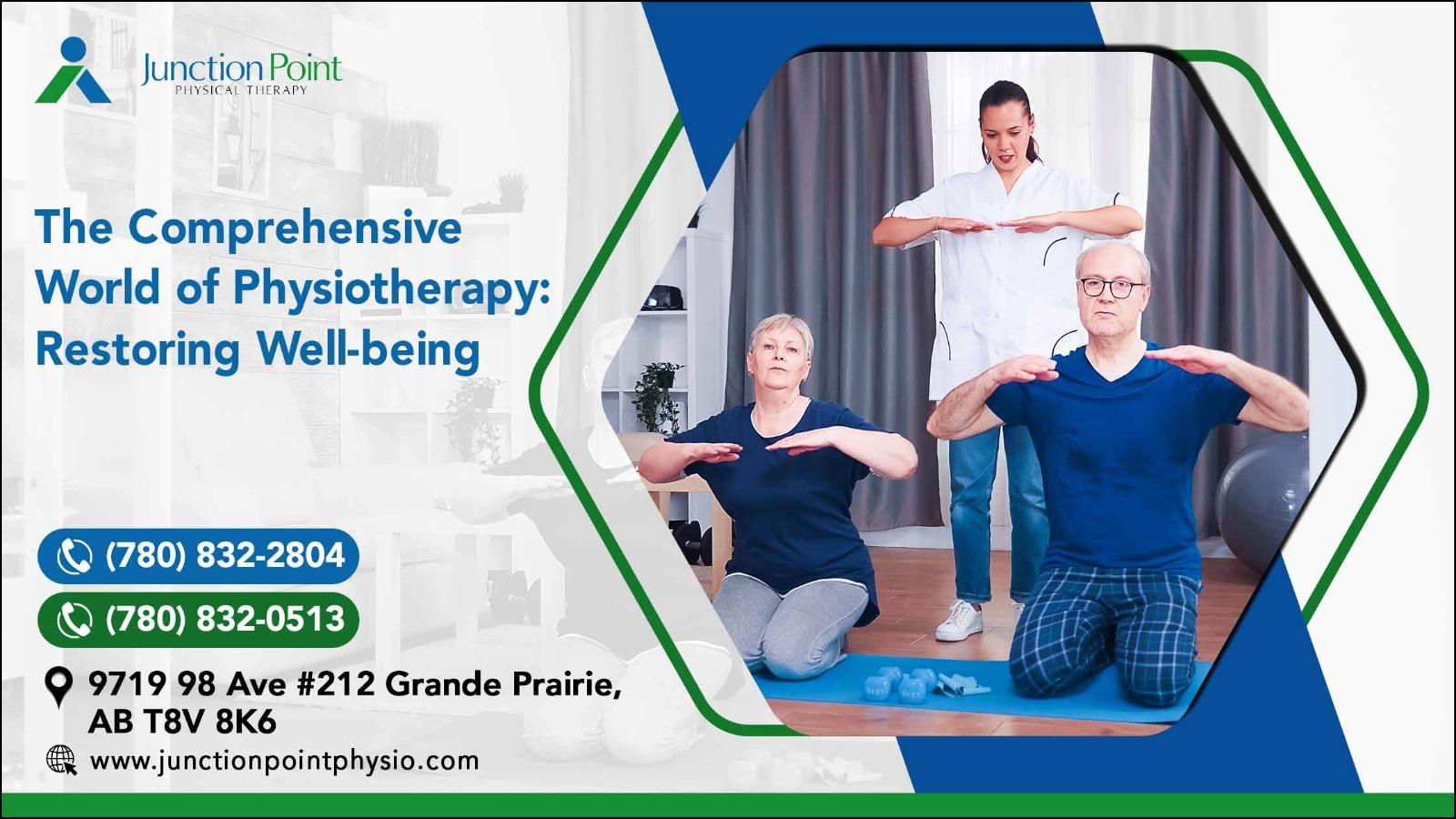
Physical therapy, often known as physiotherapy, is a critical component in the healthcare sector, focusing on the physical rehabilitation and maintenance of individuals suffering from various ailments. Grande Prairie physiotherapy, particularly at Junction Point Physical Therapy, offers a holistic approach to patient care, aiming to restore, maintain, and maximize strength, function, movement, and overall well-being.
Physiotherapy in Grand Prairie encompasses a wide range of treatments and techniques. At Junction Point Physical Therapy in Grande Prairie, the emphasis extends beyond mere symptom relief to a deeper understanding and resolution of the underlying causes. This method ensures that every patient benefits from a holistic and customized treatment plan, addressing their individual requirements comprehensively.
Overview of Physiotherapy
Physiotherapy is rooted in scientific principles and adopts an approach that considers the individual as a whole. Its essence lies in comprehending and harnessing the body's natural recovery processes from injury or disability. Highly skilled physiotherapists assist those impacted by injuries, illnesses, or disabilities using a blend of movement, exercise, manual therapy, education, and guidance.
Holistic Healing and Wellness Through Physiotherapy: Multifaceted Benefits
1. Musculoskeletal Health: Addressing Pain and Injuries
Physiotherapy effectively treats conditions like sprains, strains, and chronic pain using a combination of manual therapy, exercise, and modalities like ultrasound or heat treatment. Personalized exercise programs not only help in pain relief but also prevent the recurrence of injuries. Additionally, physiotherapists educate patients on posture and body mechanics to support long-term musculoskeletal health.
2. Neurological Health: Aiding Recovery from Neurological Disorders
Techniques such as gait training and functional exercises are crucial in helping patients regain movement and independence. Neurological physiotherapy often involves retraining the brain and nervous system to regain control over affected limbs, enhancing neuroplasticity. Patients are also taught how to safely navigate their environments, reducing the risk of falls and further injury.
3. Cardiovascular Health: Promoting Heart and Lung Function
Cardio-respiratory physiotherapy includes endurance training and exercises that increase lung capacity and improve circulation. Patients recovering from cardiac surgery or living with chronic respiratory diseases receive tailored programs to improve their overall stamina and breathing efficiency. Moreover, education about lifestyle changes and self-management techniques forms a critical component of this therapy.
4. Pediatric Health: Supporting Developmental Milestones
In pediatric physiotherapy, therapists use playful and age-appropriate exercises to motivate children and engage them in their treatment. This form of therapy is vital in addressing congenital disabilities, developmental delays, and coordination problems. By working closely with families, physiotherapists ensure that children receive comprehensive care that supports their growth and development.
5. Women’s Health: Addressing Specific Needs
Therapists provide guidance on exercises for prenatal and postnatal care, helping women manage back pain, pelvic floor dysfunction, and other pregnancy-related issues. Postpartum recovery is another critical area where physiotherapy aids in regaining strength and fitness. Additionally, women are educated about body awareness and self-care techniques, particularly related to pelvic health.
6. Geriatric Health: Assisting Aging Populations
Geriatric physiotherapy focuses on increasing mobility and reducing the risk of falls, which are common in the elderly. Therapists also address age-related conditions like arthritis and osteoporosis, using gentle exercises to maintain bone health and joint mobility. This form of therapy greatly enhances the independence and quality of life of older adults, allowing them to remain active and engaged.
7. Chronic Pain Management: Alleviating Long-Term Discomfort
Physiotherapy is instrumental in managing chronic pain, which can be due to various conditions like fibromyalgia, arthritis, or recurring headaches. By using a combination of techniques such as manual therapy, therapeutic exercises, and pain-relief modalities, physiotherapists help in reducing pain intensity and improving quality of life. Education on pain management strategies and self-help techniques are also provided, empowering patients to manage their pain effectively in their daily lives.
8. Occupational Health: Enabling Workforce Wellness
Occupational physiotherapy addresses ergonomic concerns, helping reduce workplace injuries and improve productivity. Tailored rehabilitation programs assist workers in returning to their jobs safely and efficiently after an injury. Furthermore, physiotherapists provide valuable education on correct posture and body mechanics, which is essential in preventing occupational hazards.
9. Mental Health: Contributing to Psychological Well-being
Engaging in regular physical activity through physiotherapy can notably enhance mood and lessen symptoms linked to depression and anxiety. Physiotherapists employ methods such as relaxation techniques and mindfulness to aid patients in navigating stress and emotional challenges. Furthermore, the sense of accomplishment achieved from meeting physical therapy objectives can elevate self-esteem and positively influence mental well-being.
Embracing a Healthier Future: The Transformative Power of Physiotherapy
Physiotherapy is an invaluable tool in restoring and maintaining an individual’s health and well-being. At Junction Point Physical Therapy Grande Prairie, the focus is on providing comprehensive, personalized care that addresses the unique needs of each patient. Through a combination of cutting-edge techniques and a commitment to patient education and preventative care, they play a pivotal role in helping individuals lead healthier, more active lives.
The expansive world of physiotherapy offers a beacon of hope and a path to recovery for those grappling with physical challenges. It’s a field that not only restores function and alleviates pain but also enhances the quality of life for countless individuals. As healthcare continues to advance, the role of physiotherapy will undoubtedly become increasingly vital, cementing its place as a cornerstone of modern medicine.
Also read about:
Shine On The Science and Art of Long lasting Paint Protection Solutions
Vestibular Physiotherapy What is it and When is it Needed
How can pelvic floor physiotherapy address bladder issues










